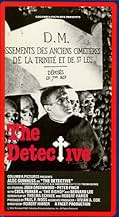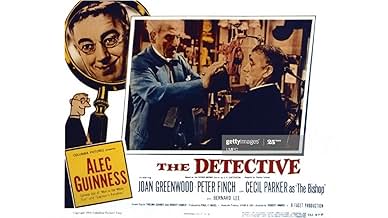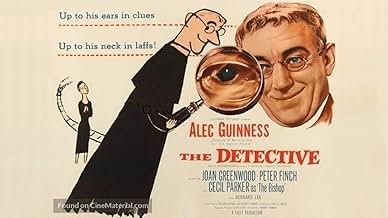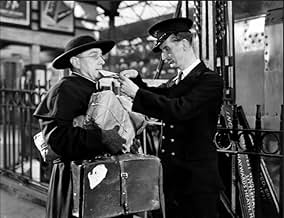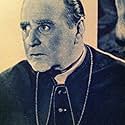Füge eine Handlung in deiner Sprache hinzuWorks of art are disappearing, stolen by a master thief, a master of disguise. Father Brown has two goals: to catch the thief and to save his soul.Works of art are disappearing, stolen by a master thief, a master of disguise. Father Brown has two goals: to catch the thief and to save his soul.Works of art are disappearing, stolen by a master thief, a master of disguise. Father Brown has two goals: to catch the thief and to save his soul.
- Auszeichnungen
- 1 Gewinn & 1 Nominierung insgesamt
- Inspector Dubois
- (as Gerard Oury)
Empfohlene Bewertungen
A number of elements in this gently comic film that are worthy of notice: Sir AlecÕs performance is deft, subtle and delightfully wry whether he is playing the sleuth or spouting philosophy to the villain Flambeau.
An added treat is a cast that includes Peter Finch, who won an Oscar for Network, Joan Greenwood, who was Lady Balleston in Tom Jones and Bernard Lee who portrayed M in the James Bond series. Guinness, Greenwood and Cecil Parker (The Bishop) also appeared together in the Ealing Studio comedy, The Man in the White Suit.
Another interesting aspect is that a large part of the film was shot on location in Paris and rural France, apparently a rarity for the British films of that era.
Finally a bit of trivia: After his portrayal of Father Brown, Guinness converted to Catholicism
He does this by undoing the crimes they have committed like stealing. He will return the stolen items.
He has a Cross that is likely to be stolen by a crook no one can identify. Father Brown is out to find that crook and bring him back to Christ.
Some of the story takes place in church to me it is very inspirational. He explains what most people do not know is that he hears the confessions of a lot of different kinds of people and he wants them to repent and come back to God.
It is heart warming to hear Scripture and also the stories of the bad people he meets and then tells them they don't have to be the way they are.
This is one movie where they are not mocking Priest, Catholics or those who believe in God. Funny and inspirational.
You can see it on Youtube. Father Brown The Detective 1954 (Alec Guiness) http://www.youtube.com/watch?v=4gqwXeHI85A
Jolly little piece of whimsical fluff from the Ealing school with Guinness perhaps a little more indulgent in his characterisation than usual. This doesn't distract though and it all makes for a pleasant enough bit of afternoon matinee viewing including a few solid laughs. Finch impresses as the worldly wise but rather sadly misguided thief with English stalwarts Sid James, Joan Greenwood and Bernard Lee providing solid support.
In his novel "Manalive" there is a moment when the appeal of his paradox reaches a point that is both understandable and questionable. The hero explains that the phrase "All that glitters is not gold" is false - all that glitters is gold. He starts pontificating on how many rarer elements (platinum?) exist that don't glitter as much, so that it is the attraction of the glitter of gold that makes it matter. One reads this discussion hoping that Chesterton is pulling our leg (a hope I still have, but it is very faint). The point of the phrase is that there are more valuable things in the universe than wealth producing items like gold - things like kindness, generosity, love. If Mr. C. was fooling us, I congratulate him on the still hit-on-the-head blow of the paradox. But if he meant it I really pity him.
I leave it to his fans to explain it to me (if they wish). "The Detective" is one of the few movies based on Chesterton's huge output. It is based on the first story of his tales of the Roman Catholic priest and detective, Father Brown: "The Blue Cross". The story is a good one (the first of the first series of "Father Brown" tales), and introduces us to Flambeau, the master thief that Brown eventually saves. But for it to be done properly (not the way the movie quite does it) several of the stories have to be put together. The first three stories of the series deal with Brown, Flambeau, and the head of the Paris police. The last commits a murder in the second story, and commits suicide before Brown exposes him. So much for a guardian of the law. Flambeau is stopped by Brown reasoning with him that he is not a bad man but a man who is on the verge of becoming one if he lets an innocent man take the blame for a theft he committed. Flambeau does repent, and subsequently becomes a detective (and an assistant to Brown).
This is a film which could have been reduced in length. Parts of the movie are quite amusing (the scene of Ernst Theisinger and Guiness breaking each other's eyeglasses is cute). The acting is also good (especially Guiness and Peter Finch as Flambeau). But the moments that move the viewer (and approach Chesterton's Catholicism) are when Guiness gives parables to explain behavior and human weakness. Witness his tale of the bad woman who fails to get pulled out of hell.
I wish the film was not so dull in so many spots, but it is definitely worth a look.
Wusstest du schon
- WissenswertesSir Alec Guinness was spotted in costume while walking home through the French countryside. A young boy ran up to him, yelling "Mon père! Mon père!" ("My father! My father!") Guinness did not speak French, so he could not correct his mistake, but was touched that the boy apparently immediately bonded to him on the assumption that he was a priest. Soon after this movie was released, Guinness converted to Catholicism.
- PatzerIn the stained-glass window behind the (catholic) bishop, there is a portrait of Henry VIII (second from left). Given that Henry was the first king to oppose the pope and separate the Church of England from the catholic church, his face would never be tolerated in this place.
- Zitate
Father Brown: Perhaps you think a crime horrible because you cannot imagine yourselves committing it. That isn't true, you know. What really horrifies you is the secret and shameful knowledge that you are capable of committing it. We all are, I no less than you. We were not made good people or bad people. We were made people.
- VerbindungenRemake of Father Brown, Detective (1934)
Top-Auswahl
- How long is The Detective?Powered by Alexa
Details
- Erscheinungsdatum
- Herkunftsland
- Sprachen
- Auch bekannt als
- The Detective
- Drehorte
- Strand-on-the-Green, Chiswick, London, England, Vereinigtes Königreich(The walk after Father Brown's release from the Police Station)
- Produktionsfirma
- Weitere beteiligte Unternehmen bei IMDbPro anzeigen
- Laufzeit1 Stunde 31 Minuten
- Farbe
- Seitenverhältnis
- 1.37 : 1
Zu dieser Seite beitragen


